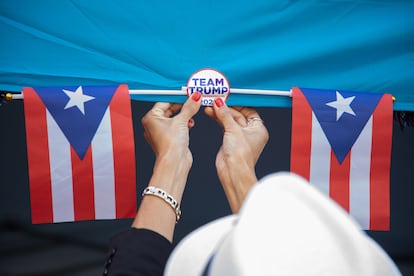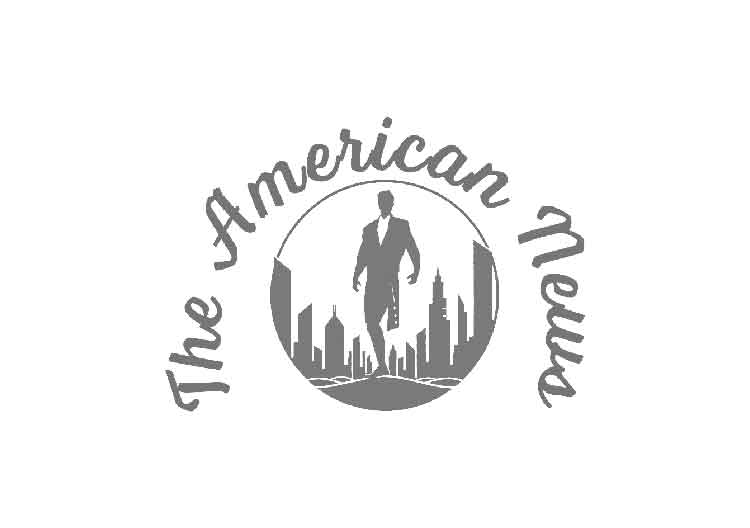Camille Rivera remembers that her grandmother died longing to return to her homeland, her house and land in Puerto Rico. Her family had decided to move her to New York after she was diagnosed with Alzheimer’s so she could receive better treatment than she could get on the island, where the health system is in a crisis. “Until she lay down and took her last breath, she always said, ‘I have land and I have a home, and I want to go back,’” Rivera recounts. Like her grandmother, many of the six million Puerto Ricans in the diaspora in the United States dream of setting foot in their country again, but the reality on the island dissuades them: an electrical grid in pieces, closed schools, gentrified neighborhoods, mismanaged public funds…
That is why Rivera decided to found last June La Brega y Fuerza, an initiative that seeks to mobilize the Puerto Rican diaspora throughout the United States to exercise their right to vote in the presidential elections on November 5, a privilege that is denied to those residing in the U.S. territory. This way, the Puerto Rican electorate in states such as Florida, where 1.2 million Puerto Ricans reside, New York (with almost one million) or Pennsylvania (500,000), can amplify the concerns of their compatriots on the island.
“We need to build a pipeline of power that connects people on the island to the diaspora in a more profound way,” Rivera synthesizes. That diaspora has been growing exponentially since 2017, the year Hurricane Maria devastated the island and forced a mass exodus to the U.S. mainland. The arrival of thousands of Puerto Ricans since then to states like Pennsylvania, Florida, North Carolina, Georgia and New York has given them significant political influence, especially within the coveted Latino vote, since, as U.S. citizens, as soon as they settle in the country they are eligible to vote, unlike other Latin American immigrants.
This reality has not escaped Kamala Harris nor Donald Trump. Both candidates have recently redoubled their efforts to appeal to the Puerto Rican electorate, especially in the key state of Pennsylvania, where 80% of the Latino vote is Puerto Rican. Recently, the Republican and Democratic campaigns held rallies in the state within a week of each other in which they explicitly sought to appeal to Puerto Rican voters.
In Trump’s case, the former president invited to his rally in Johnstown (Pennsylvania) last August 30 two unusual characters: Puerto Rican reggaeton artists Anuel AA and Justin Quiles. “Gentlemen, get up here quick because I don’t know if these people know who the hell they are, but it’s good for the Puerto Rican vote. All Puerto Ricans are going to vote for Trump now,” said the Republican candidate as he introduced the singers. Both wore caps with the Republican candidate’s signature phrase, Make America Great Again, and made it clear why they had come to the rally. “The world knows that the best president this country has ever seen is named Donald Trump,” Anuel assured. “A lot of us Latinos are standing strong with Trump,” Quiles added. Since then, Nicky Jam, another Puerto Rican reggaetonero, also showed his support for the Republican at a rally where Trump mistakenly introduced him as a “hot” woman.

A week later, some 200 miles away, it was the Democrats’ turn. Last September 7, in Allentown, one of the cities with the highest proportion of Latino voters in Pennsylvania, the “second gentleman” and husband of Kamala Harris, Douglas Emhoff, was greeted at the first Democratic campaign rally dedicated to the Latino community with banners reading “Boricuas con Harris-Walz” (Puerto Ricans with Harris-Walz). He was accompanied by Miguel Cardona, Secretary of Education and the only Puerto Rican in President Joe Biden’s cabinet. Cardona highlighted his Puerto Rican background, identifying himself as a proud grandson of Puerto Rican farmers who, he recounted, told him that to have a good harvest, you have to know how to plant seeds. “Planting seeds for the future generation is what the Harris-Walz ticket is all about,” he said.
For experts and community organizers, it was time for both parties to recognize the importance of this electorate, especially in Pennsylvania, where there are 500,000 Latinos registered to vote and 400,000 of them are Puerto Rican. Nilda Ruiz, president of the National Puerto Rican Agenda and the Philadelphia-based Asociación Puertorriqueños en Marcha, explains that the key is in the numbers. “Considering those 400,000 voters and seeing the very small margin by which Biden won in 2020 (81,660 votes) and by which Hillary Clinton lost in 2016 (44,292), if we can activate the Puerto Rican vote, we can change the elections in favor of what we want,” she says.
“With 400,000 voters and the margin by which Biden won in 2020 (81,660 votes) and Hillary Clinton lost in 2016 (44,292), if we can activate the Puerto Rican vote, we can swing the election”
Nilda Ruiz
“Many say that Puerto Ricans don’t vote in large numbers, but it’s because there have been no incentives,” Ruiz adds, referring to previous elections in which Puerto Rican turnout has been low, according to various studies and exit polls. “If we can educate people about the policies that affect Puerto Ricans in Puerto Rico and here, they become more motivated to vote,” she says.
Jimmy Torres Vélez, vice president of the National Puerto Rican Agenda, agrees. “If we go out to vote we have the ability to tip the scales,” notes the also leader of Llamado Boricua, a new initiative aimed at educating and encouraging Puerto Ricans in Florida to vote. “Of the nearly 1.2 million Puerto Ricans in Florida, there must be 900,000 who are of voting age and meet all the requirements,” Torres Velez points out. In 2020 Trump carried this state by 371,686 votes and in 2016 by only 112,911. Therefore, despite the fact that many take for granted the fact that Florida has become Republican territory, the unionist highlights that the Puerto Rican vote is still key and deserves more attention.
On this last point, Torres Vélez emphasizes that while both campaigns are fighting for Pennsylvania, community organizers in Florida feel that the Democratic Party has forgotten about them. While it is true that this state, historically considered a deciding territory for any White House hopeful, has been leaning more to the right in recent years, Torres Vélez insists that Democrats cannot simply “throw their hands up in the air.”
Although Puerto Ricans tend to vote blue, in states like Florida they are increasingly voting red. “Many Puerto Ricans I know are Republicans because when they moved to Florida there was nothing else,” Torres Vélez points out. For him, the problem lies in that Democrats don’t want to invest in the state because they don’t see it feasible to win there. “It’s a mentality of: ‘I invest if I win, but since I don’t win, I don’t invest,’” he explains. “But you can’t forget about Florida even if you lose. We have to break that vicious circle,” he stresses.
“The Democrats are naturally more like us because their policies are aimed more at helping our people. The other side, with their actions, what they do is ridicule and disrespect us constantly. They look for a trap singer, bring him out on a stage and say ‘I don’t know who this guy is, but he’s going to give us the Puerto Rican vote.’ That is not the conversation we want or need to have,” says the leader of Llamado Boricua.
Work on the ground in Puerto Rican communities
As important, if not more important, than getting both parties to pay attention to the Puerto Rican electorate is educating these voters about the U.S. electoral system and registering them to participate. “The most important thing is to know how to approach voters,” says Natascha Otero-Santiago, founder of the Boricuas con Kamala campaign, who has been organizing the Puerto Rican vote for Democrats since Barack Obama’s candidacy.
Otero-Santiago explains that “there are different Puerto Rican diasporas” that are characterized by “the amount of time they have spent in the United States.” For example, most Puerto Ricans in Florida arrived in the state in the last five to 10 years, while Puerto Ricans in New York have been arriving since the second half of the last century. Therefore, these new voters in Florida know less about how elections work in the country, since the procedures are different on the island, and they need to be taught more about it. “It’s important to pay attention to those nuances,” Otero-Santiago says.
Organizations such as La Brega y Fuerza have taken on this task in communities in New York, Pennsylvania and North Carolina. “We have created several programs in areas where there is a high density or large population of Puerto Rican voters to help them register and persuade them to make their voices heard,” Rivera said. In addition, the group is preparing a series of resources to disseminate that will explain each candidate’s policies on issues affecting the Puerto Rican community on and off the island.
Another entity working to mobilize these communities is Boricua Vota, led by Torres Vélez from Florida. The activist, who has been advocating for Puerto Rico and its diasporas for 40 years, explains that the goal is to elevate to the national conversation “what is in the best interest of us as Puerto Ricans and us as puertorriqueños, because there is a difference. When we live here we are guided by a set of particular interests — access to education, affordable housing, among others — but we also have a commitment because we sleep here but we dream of Puerto Rico,” he says. “Our heart is in Puerto Rico, so we have to make sure that the federal government’s policies are beneficial to the island.”
Sign up for our weekly newsletter to get more English-language news coverage from EL PAÍS USA Edition
Source link : http://www.bing.com/news/apiclick.aspx?ref=FexRss&aid=&tid=66e84d1312e7442f880634315696d4aa&url=https%3A%2F%2Fenglish.elpais.com%2Fusa%2Felections%2F2024-09-16%2Fthe-key-fight-between-harris-and-trump-for-the-puerto-rican-vote-in-the-diaspora-from-anuel-aa-to-miguel-cardona.html&c=3962131803893776081&mkt=en-us
Author :
Publish date : 2024-09-16 03:49:00
Copyright for syndicated content belongs to the linked Source.
